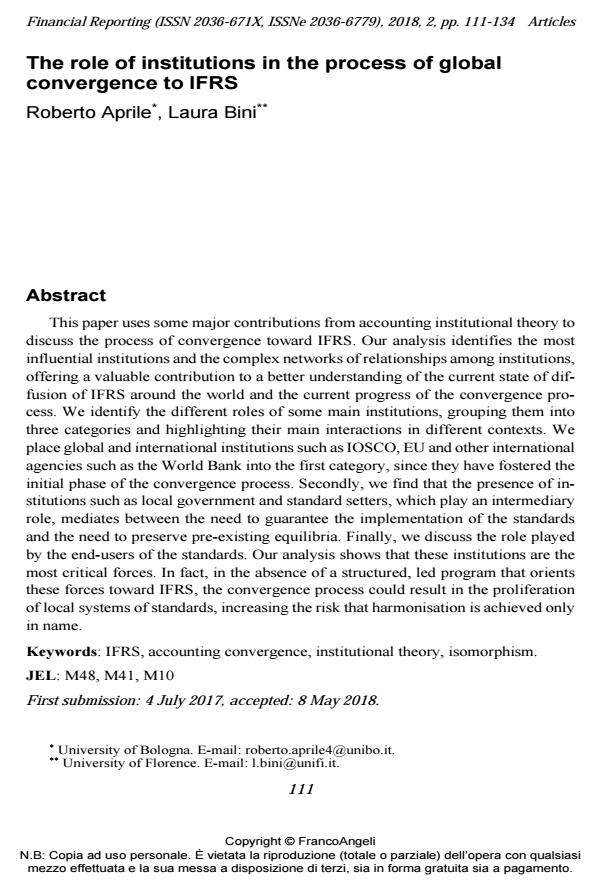The role of institutions in the process of global convergence to IFRS
Titolo Rivista FINANCIAL REPORTING
Autori/Curatori Roberto Aprile, Laura Bini
Anno di pubblicazione 2018 Fascicolo 2018/2
Lingua Inglese Numero pagine 24 P. 111-134 Dimensione file 312 KB
DOI 10.3280/FR2018-002005
Il DOI è il codice a barre della proprietà intellettuale: per saperne di più
clicca qui
Qui sotto puoi vedere in anteprima la prima pagina di questo articolo.
Se questo articolo ti interessa, lo puoi acquistare (e scaricare in formato pdf) seguendo le facili indicazioni per acquistare il download credit. Acquista Download Credits per scaricare questo Articolo in formato PDF

FrancoAngeli è membro della Publishers International Linking Association, Inc (PILA), associazione indipendente e non profit per facilitare (attraverso i servizi tecnologici implementati da CrossRef.org) l’accesso degli studiosi ai contenuti digitali nelle pubblicazioni professionali e scientifiche.
This paper uses some major contributions from accounting institutional theory to discuss the process of convergence toward IFRS. Our analysis identifies the most influential institutions and the complex networks of relationships among institutions, offering a valuable contribution to a better understanding of the current state of diffusion of IFRS around the world and the current progress of the convergence process. We identify the different roles of some main institutions, grouping them into three categories and highlighting their main interactions in different contexts. We place global and international institutions such as IOSCO, EU and other international agencies such as the World Bank into the first category, since they have fostered the initial phase of the convergence process. Secondly, we find that the presence of institutions such as local government and standard setters, which play an intermediary role, mediates between the need to guarantee the implementation of the standards and the need to preserve pre-existing equilibria. Finally, we discuss the role played by the end-users of the standards. Our analysis shows that these institutions are the most critical forces. In fact, in the absence of a structured, led program that orients these forces toward IFRS, the convergence process could result in the proliferation of local systems of standards, increasing the risk that harmonisation is achieved only in name.
Parole chiave:IFRS, accounting convergence, institutional theory, isomorphism.
Jel codes:M48, M41, M10
- Integrated Sustainability Reporting Laura Bini, Marco Bellucci, pp.53 (ISBN:978-3-030-24953-3)
- Environmental, Social, Governance (ESG) Roberto Aprile, Sergio Bovo, pp.781 (ISBN:978-3-031-76617-6)
Roberto Aprile, Laura Bini, The role of institutions in the process of global convergence to IFRS in "FINANCIAL REPORTING" 2/2018, pp 111-134, DOI: 10.3280/FR2018-002005